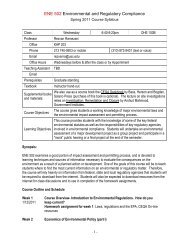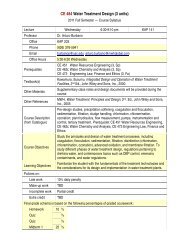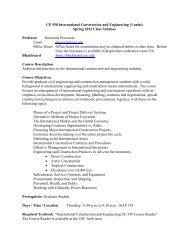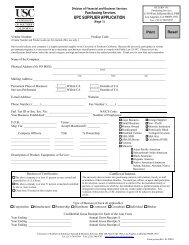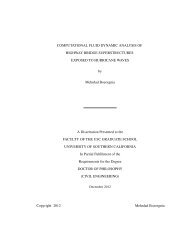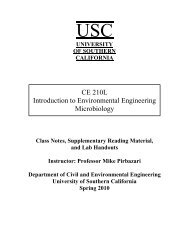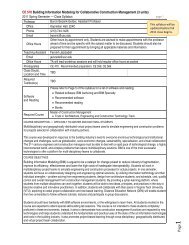CE 465 Course Syllabus - USC
CE 465 Course Syllabus - USC
CE 465 Course Syllabus - USC
Create successful ePaper yourself
Turn your PDF publications into a flip-book with our unique Google optimized e-Paper software.
<strong>CE</strong> <strong>465</strong><br />
ENE<br />
Water Supply and Sewerage System Design<br />
<strong>USC</strong> | SONNY ASTANI DEPARTMENT OF CIVIL AND ENVIRONMENTAL ENGINEERING<br />
3 Units<br />
Contribution of <strong>Course</strong> to Meeting the Professional Component<br />
Engineering Topics | Design<br />
Students will understand the design process and learn approaches used to solve various engineering problems that are<br />
representative of those found in a professional environment. They will practice decision-making skills as they apply their<br />
knowledge of basic sciences, mathematics, and the engineering sciences to convert resources optimally to meet the stated<br />
needs of a project.<br />
In this class, students will learn the fundamentals of analysis and design of steel structures, structural elements, and simple<br />
and eccentric connections. The course culminates with a design project.<br />
Engineering Topics | Other<br />
Constraints and Considerations. Students will understand the diverse constraints and considerations that are representative<br />
of what they will encounter in an engineering practice. This course covers the following topics:<br />
Economic | Environmental | Sustainability | Manufacturability | Ethical | Health and Safety | Social | Political | Energy<br />
Relation of <strong>Course</strong><br />
Objectives to Program Outcomes<br />
The Civil Engineering program is designed<br />
to teach beyond the technical content of the<br />
curriculum and prepare the students to<br />
utilize what they learn in a professional<br />
setting.<br />
This course contributes to the program<br />
outcomes as outlined in the adjacent table.<br />
<strong>Course</strong> Contribution to Program Outcomes (a-k)<br />
a. An ability to apply knowledge of mathematics, science, and<br />
engineering.<br />
b. An ability to design and conduct experiments, as well as to analyze<br />
and interpret data.<br />
c. An ability to design a system component or process to meet desired<br />
needs within realistic constraints such as economic, environmental,<br />
social, political, ethical, health and safety, manufacturability, and<br />
sustainability.<br />
<br />
Key<br />
Prepared by:<br />
Dr. CC Wang<br />
Professor of Civil and Environmental Engineering<br />
Date: Spring 2013<br />
Page 2


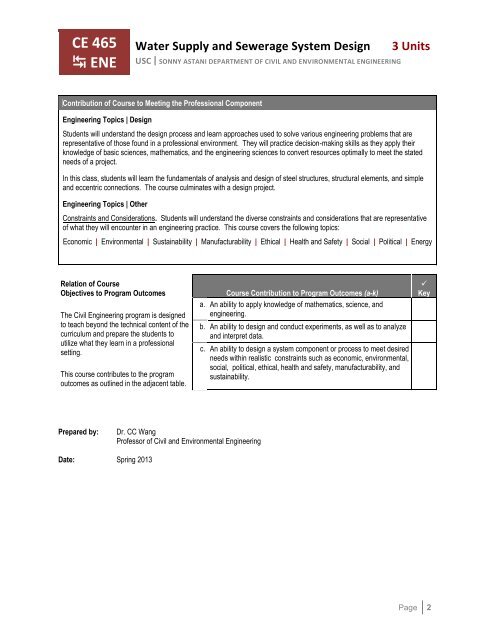
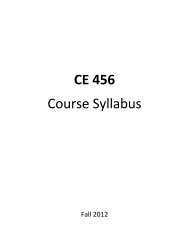
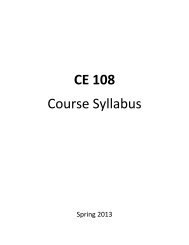
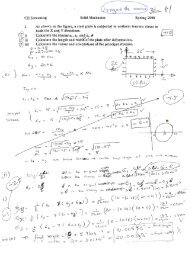
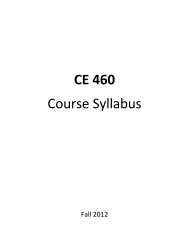
![Dr. Yan Xiao Bamboo Road Bridge can Support 16-Ton[ne] - USC](https://img.yumpu.com/37910641/1/190x245/dr-yan-xiao-bamboo-road-bridge-can-support-16-tonne-usc.jpg?quality=85)
